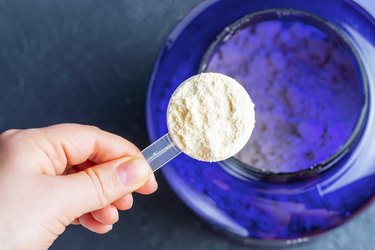
Creatine is a natural substance found in certain meats and fish and also produced by the human body. It is also consumed in supplement form, most often by strength-training athletes and bodybuilders. A misconception of creatine is that it burns fat directly when in fact that's not its purpose at all. However, creatine can help to burn fat in an indirect way as part of a consistent resistance training program. Consult your doctor prior to starting a creatine regimen.
Purpose
Video of the Day
Creatine is a nitrogenous acid stored in muscle tissue; in the body it's known as phosphocreatine. When creating is broken down in the muscle tissue, it forms the muscle's most important source of energy called ATP. Creatine stores are often used up after an intense resistance training workout -- such as lifting weights -- and a creatine supplement helps to quickly restore the body's supply. According to the University of Illinois McKinley Health Center, creatine supplementation is not effective for endurance athletes or sedentary people. It's also not effective at burning fat directly.
Video of the Day
Dosage Recommendation
Following the correct dosage requirements of creatine can help maximize your results and minimize health risks. McKinley Health Center recommends consuming 20 to 25 grams of creatine per day for a period of five to seven days; each dose must be consumed in 5 gram increments spread equally throughout the day. After the first week, consume 3 to 5 grams per day. While the creatine will not directly burn body fat, it can help you build muscle and tone your body more effectively.
Burning Fat
The indirect effect creatine can have on fat-burning is related to the supplement's proven ability to help you build muscle. According to a report in the July-December issue of the "Journal of Midlife Health," increasing your muscle mass is a powerful way to burn fat because muscle tissue naturally burns more calories than fatty tissue. In other words, as creatine helps to speed up your muscle gains, your body will burn more calories due to the increase in lean muscle mass. That's how creatine can indirectly help you lose weight over time.
Considerations
Creatine will not provide any indirect fat-burning benefit unless you take part in a consistent resistance training program. You must increase your lean muscle mass before any sort of fat-burning "side effect" is seen. Exercise at least three times per week for up to 60 minutes per session. Target each of your major muscle groups at least once per week, including your chest, shoulders, legs, abdominals, back and arms. Also, be sure to discuss the pros and cons of taking creatine and whether it is right for you.
Cautions
The University of Maryland Medical Center cautions that extended use of creatine may have negative side effects, including the breakdown of muscle tissue and kidney failure. Other potential side effects are an irregular heartbeat, high blood pressure, liver problems and stomach upset. Never take more than the recommended dose of creatine, and if you experience any side effects then discontinue use and contact your physician.